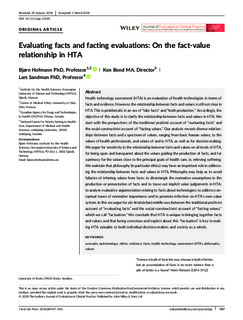| dc.contributor.author | Hofmann, Bjørn Morten | |
| dc.contributor.author | Bond, Ken | |
| dc.contributor.author | Sandman, Lars | |
| dc.date.accessioned | 2019-04-30T10:25:37Z | |
| dc.date.available | 2019-04-30T10:25:37Z | |
| dc.date.created | 2018-10-28T20:20:14Z | |
| dc.date.issued | 2018 | |
| dc.identifier.citation | Journal of Evaluation In Clinical Practice. 2018, 24 (5), 957-965. | nb_NO |
| dc.identifier.issn | 1356-1294 | |
| dc.identifier.uri | http://hdl.handle.net/11250/2596106 | |
| dc.description.abstract | Health technology assessment (HTA) is an evaluation of health technologies in terms of facts and evidence. However, the relationship between facts and values is still not clear in HTA. This is problematic in an era of “fake facts” and “truth production.” Accordingly, the objective of this study is to clarify the relationship between facts and values in HTA. We start with the perspectives of the traditional positivist account of “evaluating facts” and the social‐constructivist account of “facting values.” Our analysis reveals diverse relationships between facts and a spectrum of values, ranging from basic human values, to the values of health professionals, and values of and in HTA, as well as for decision making. We argue for sensitivity to the relationship between facts and values on all levels of HTA, for being open and transparent about the values guiding the production of facts, and for a primacy for the values close to the principal goals of health care, ie, relieving suffering. We maintain that philosophy (in particular ethics) may have an important role in addressing the relationship between facts and values in HTA. Philosophy may help us to avoid fallacies of inferring values from facts; to disentangle the normative assumptions in the production or presentation of facts and to tease out implicit value judgements in HTA; to analyse evaluative argumentation relating to facts about technologies; to address conceptual issues of normative importance; and to promote reflection on HTA's own value system. In this we argue for a(n Aristotelian) middle way between the traditional positivist account of “evaluating facts” and the social‐constructivist account of “facting values,” which we call “factuation.” We conclude that HTA is unique in bringing together facts and values and that being conscious and explicit about this “factuation” is key to making HTA valuable to both individual decision makers and society as a whole. | nb_NO |
| dc.language.iso | eng | nb_NO |
| dc.publisher | Wiley | nb_NO |
| dc.rights | Attribution-NonCommercial-NoDerivatives 4.0 Internasjonal | * |
| dc.rights.uri | http://creativecommons.org/licenses/by-nc-nd/4.0/deed.no | * |
| dc.title | Evaluating facts and facting evaluations: On the fact-value relationship in HTA | nb_NO |
| dc.type | Journal article | nb_NO |
| dc.type | Peer reviewed | nb_NO |
| dc.description.version | publishedVersion | nb_NO |
| dc.source.pagenumber | 957-965 | nb_NO |
| dc.source.volume | 24 | nb_NO |
| dc.source.journal | Journal of Evaluation In Clinical Practice | nb_NO |
| dc.source.issue | 5 | nb_NO |
| dc.identifier.doi | 10.1111/jep.12920 | |
| dc.identifier.cristin | 1624244 | |
| dc.description.localcode | © 2018 The Authors Journal of Evaluation in Clinical Practice Published by John Wiley & Sons Ltd This is an open access article under the terms of the Creative Commons Attribution‐NonCommercial‐NoDerivs License. | nb_NO |
| cristin.unitcode | 194,65,70,0 | |
| cristin.unitname | Institutt for helsevitenskap Gjøvik | |
| cristin.ispublished | true | |
| cristin.fulltext | preprint | |
| cristin.qualitycode | 1 | |

